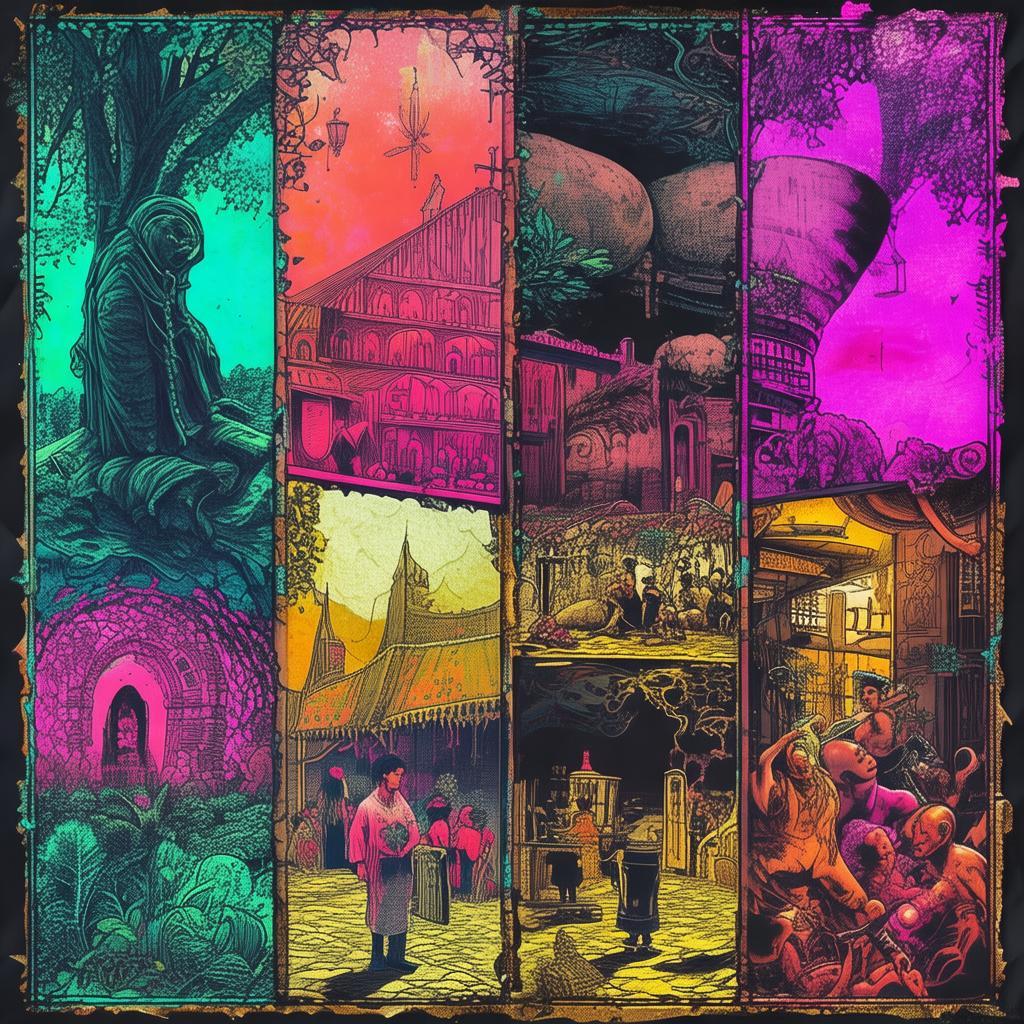Whispers of the Desert: A Tale of Two Hearts
In the heart of the Gobi Desert, where the sands whisper ancient secrets and the sky stretches endlessly, there lived a nomad named Aisha. Her life was a tapestry woven from the threads of solitude and the call of the wild. She roamed the desert with her flock, her heart a silent drumbeat to the rhythm of the earth beneath her feet.
One day, as she wandered through the dunes, Aisha stumbled upon a small, abandoned tent. Inside, she found a journal, its pages filled with tales of a love that had once burned as fiercely as the desert sun. The journal belonged to a young couple, Sanmao and Wang Luobin, who had ventured into the desert in search of a life together, only to be torn apart by fate.
The journal spoke of their love, a love that was as strong as the desert winds that swept through their tent. Sanmao, a poet, had written of the beauty of the desert, of the way it could both nurture and destroy. Wang Luobin, a painter, had captured the stark beauty of the landscape on canvas, his heart painted in strokes of red and gold.
Aisha felt a strange connection to their story, as if her own heart had been touched by the same desert magic that had once touched theirs. She began to read the journal, her eyes lingering over the words that spoke of joy, sorrow, and the enduring power of love.
As she read, Aisha felt a sense of purpose. She knew that the desert had claimed Sanmao and Wang Luobin, but she also knew that their love had not been entirely lost. It had been buried beneath the sands, waiting to be rediscovered.
With a newfound determination, Aisha set out to find the places where Sanmao and Wang Luobin had walked, where they had painted and loved. She followed the trail of their footsteps, her heart a compass guiding her through the shifting sands.

She visited the oases where they had found solace, the mountains where they had painted the sky, and the dunes where they had danced under the stars. At each place, Aisha left a small token of remembrance, a poem or a painting, a testament to the love that had once flourished there.
As she journeyed deeper into the desert, Aisha began to understand the true meaning of love. It was not just a feeling, but a way of life, a commitment to the enduring spirit of two souls. She realized that Sanmao and Wang Luobin's love had not died with them; it had simply transformed, becoming a part of the desert itself.
One evening, as the sun dipped below the horizon, casting long shadows across the dunes, Aisha reached a place where the desert met the sky. She stood there, surrounded by the vastness of the desert, and felt a profound connection to Sanmao and Wang Luobin. She knew that their love had become a part of her own, a reminder that even in the most desolate places, love could thrive.
As the desert night fell, Aisha sat down and began to write her own story, a story of love that would outlast her own life. She wrote of the desert, of the way it could be both a friend and a foe, and of the love that could survive even the harshest of conditions.
She wrote of Sanmao and Wang Luobin, of their courage and their passion, and of the love that had outlived them. She wrote of her own journey, of the way it had changed her, and of the way it had brought her closer to the heart of the desert.
And as she wrote, Aisha knew that she had found her purpose. She had become the keeper of a love story, a story that would echo through the ages, a testament to the enduring power of the human heart.
The next morning, as the sun rose, casting a golden glow over the desert, Aisha buried the journal in the sand, a final act of respect for Sanmao and Wang Luobin. She knew that their story would live on, not just in the pages of the journal, but in the hearts of all who heard it.
And so, Aisha continued her journey, her heart a beacon of love in the vast desert, her story a whisper that would echo through the ages, a testament to the enduring power of the human spirit.
In the end, Aisha's story became one with that of Sanmao and Wang Luobin, a tale of love that transcended time and space, a story that would be told and retold, a reminder that love, like the desert, is both vast and enduring.
✨ Original Statement ✨
All articles published on this website (including but not limited to text, images, videos, and other content) are original or authorized for reposting and are protected by relevant laws. Without the explicit written permission of this website, no individual or organization may copy, modify, repost, or use the content for commercial purposes.
If you need to quote or cooperate, please contact this site for authorization. We reserve the right to pursue legal responsibility for any unauthorized use.
Hereby declared.









